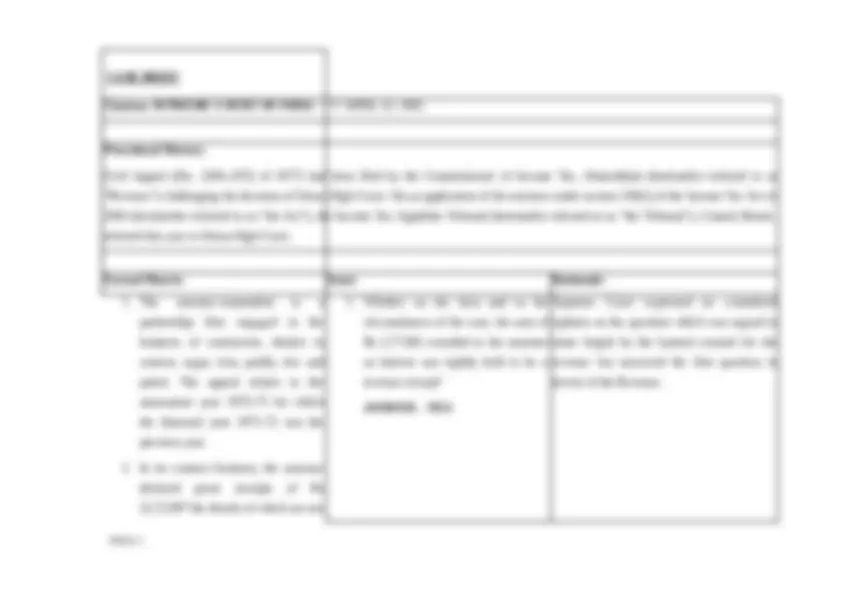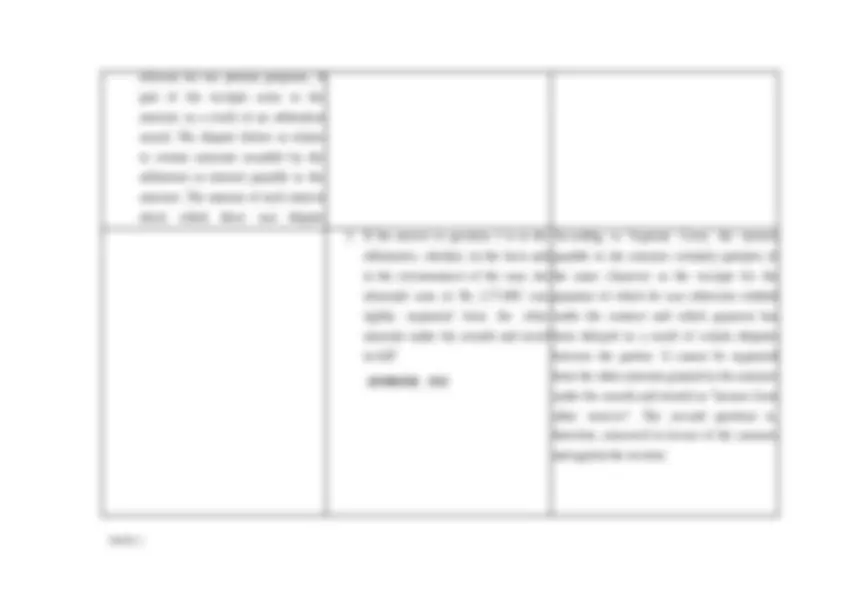







Study with the several resources on Docsity

Earn points by helping other students or get them with a premium plan


Prepare for your exams
Study with the several resources on Docsity

Earn points to download
Earn points by helping other students or get them with a premium plan
Community
Ask the community for help and clear up your study doubts
Discover the best universities in your country according to Docsity users
Free resources
Download our free guides on studying techniques, anxiety management strategies, and thesis advice from Docsity tutors
A case brief of the supreme court of india judgment in the case of commissioner of income-tax, orissa v. Govinda choudhury & sons. The case revolves around the question of whether the interest awarded to the assessee can be considered a revenue receipt for taxation purposes. The procedural history, factual matrix, arguments presented by both parties, and the court's decision.
Typology: Study Guides, Projects, Research
1 / 9

This page cannot be seen from the preview
Don't miss anything!






BEFORE S. RANGANATHAN, V. RAMASWAMI AND YOGESHWAR DAYAL, JJ.
DR. VIPAN GOYAL
PROJECT COORDINATER
SUCHITRA SHEORAN
ROLL NUMBER – 16123
GROUP NO. 16
relevant for our present purposes. A part of the receipts arose to the assessee as a result of an arbitration award. The dispute before us relates to certain amounts awarded by the arbitrators as interest payable to the assessee. The amount of such interest about which there was dispute between the parties was mentioned by the Income Tax Officer as Rs 4,30,549. But the Tribunal has found that the interest that can be taken into account for the assessment year under consideration is only Rs 2,77,692.
According to Supreme Court, the interest payable to the assessee certainly partakes of the same character as the receipts for the payment of which he was otherwise entitled under the contract and which payment has been delayed as a result of certain disputes between the parties. It cannot be separated from the other amounts granted to the assessee under the awards and treated as “income from other sources”. The second question is, therefore, answered in favour of the assessee and against the revenue.
Dicta:
On the second question court held, The sum of Rs 2,77,692 was received by the assessee as interest on the amounts which were determined to be payable by the assessee in respect of certain contracts executed by the assessee and in regard to the payments under which there was a dispute between the two parties. The assessee is a contractor. His business is to enter into contracts. In the course of the execution of these contracts he has also to face disputes with the State Government and he has also to reckon with delays in payment of amounts that are due to him. If the amounts are not paid at the proper time and interest is awarded or paid for such delay, such interest is only an accretion to the assessee's receipts from the contracts. It is obviously attributable and incidental to the business carried on by him. It would not be correct, as the Tribunal has held to say that this interest is totally dehors the contract business carried on by the assessee. It is well settled that interest can be assessed under the head ‘income from other sources’ only if it cannot be brought within one of the other specific heads of charge. Court found it difficult to comprehend how the interest receipts by the assessee can be treated as receipts which flow to him dehors the business which is carried on by him. According to Supreme Court, the interest payable to the assessee certainly partakes of the same character as the receipts for the payment of which he was otherwise entitled under the contract and which payment has been delayed as a result of certain disputes between the parties. It cannot be separated from the other amounts granted to the assessee under the awards and
Alternative argument, having regard to the facts and circumstances of the present case, his instructions are to concede the answer to the first question in favour of the revenue. In other words, he is willing to proceed on the footing that the sum of Rs 2,77,692 was only in the nature of a revenue receipt.
This argument was accepted by Supreme Court.
ISSUE:
even if the amount under consideration was revenue receipt relating to contract business, in view of the settlement with the revenue that ten per cent. of the gross receipts would be computed as income, it was not open to the Income-tax Officer to break up the gross receipts and treat a part thereof as income in entirety and exclude the application of the settlement rate therefor.
This argument was accepted by Supreme Court.
Respondent’s Argument The interest received by the assessee is income under “income from other sources” and is fully taxable. This argument was rejected by Supreme Court.
As per A.265 Of the Constitution of India, for the collection and levy of any Tax the authority of law has been made necessary. Under any taxation statute i.e. which stands as the authority of law, for the collection and levy there needs to be a taxable entity as well as taxable event, in this case this case the taxable event was the award of interest by arbitrator for delayed payment of amounts in respect of certain contracts executed by the assessee. The partnership firm is taxable entity as it is a person according to the definition of person under section 2(31).
The interest in this case was considered as revenue receipt by the Supreme Court, and revenue receipt are taxable unless a receipt is specifically exempted. Other receipts those are capital receipts, not taxable generally unless there is a provision to tax it. So here the interest received to assessee forms basis of charge for tax, it is to be determined under which head. The head income from other sources includes interest on securities and interest on compensation, so it is well settled that interest if granted on the compensation received from an award, then it would have been taxed under section 56 of Income Tax Act, 1961. But as per the facts and evidences provided and as per the findings of the court, the interest payed in this case is on the amount which the assessee was entitled to receive out of the contract.
The Revenue i.e. the income tax department considered the interest as part of income under the head “income from other sources”. Generally interest awarded by arbitrator is considered as revenue receipt under “income from other sources”, and an income comes under this head when it is not expressly included under other four heads of income. Here in this case the interest awarded by the arbitrator was not in the nature of capital gains or income from other sources, as alleged by the income tax department, rather it was in the character of the receipts for the payment of which he was otherwise entitled under the contract and which payment has been delayed as a result of certain disputes between the parties.